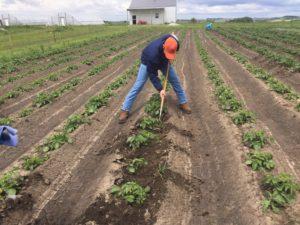On Wednesday, May 24, we had the ability to visit the birthplace Henry A. Wallace in Orient, Iowa. The former Secretary of Agriculture and Vice President’s childhood home has been converted into a gathering place and community supported agriculture farm. The actual homestead is now a gift shop, and the old barn was converted into a working semi-public restaurant. The purpose of the property is to gather as a community and share ideas with new people. According to Diane, our guide during lunch, when there are dinners at the Wallace House, the staff mixes up the seating. This way, you don’t sit with the same people you came with. Because of this, you can experience new thoughts and emotions, while enjoying a fresh home-cooked meal. All the food is prepared on sight with ingredients from their garden, which is a local CSA. CSA is short for community supported agriculture. Within the CSA, customers purchase a share of the crop for a season. Those people who buy into the program get weekly baskets of fresh fruits, vegetables, or whatever is grown and harvested that week. The point of a CSA is to allow farmers to have a steady customer base and give them the ability to grow what they want. They can also try new things.
To our excitement, we had the ability to work in the garden. With the help of farm manager Mosa Shayan, we grabbed our hoes and headed out to the field. Since Mosa and the farm are organic, there can’t be any pesticides or herbicides used. So, we had the simple, yet difficult task of removing weeds of the seed rows. This is basically the organic farmer version of picking up rocks. Although there were only about 30 rows potatoes, the task took about two hours. When weeding, you had to be careful to just get out the weeds and not the potatoes you’re supposed to be protecting. During this time, we had the chance to talk with Mosa about his life, how he got started farming, and the troubles he faces as a small farmer. We also got to have some one-on-one time with whoever we shared our row with.
The Wallace house is important for a variety of reasons. Henry A. Wallace was a strong progressive. He believed in quick and rapid change, but also helping those who couldn’t afford to do so. Not only did he work under President Roosevelt in the height of the Great Depression, but he also had his own, although unsuccessful, run at the presidency. He also believed in the exchanging of ideas. Wallace regularly invited people on every side of the political spectrum to the drawing board while he was formulating his policies. The Wallace House is attempting to do the same thing. By hosting dinners and events, ideas can organically flow. When you sit with different people, you express and hear different values and practices. If an unconventional organic CSA farmer sits next to a conventional farmer, odds are they will discuss their similar, yet completely different professions. They can talk about their practices and their own idea of sustainability. In turn, people can understand each side of the spectrum better. Even in our own small lunch, we talked about the troubles that often plague small organic farmers and what they are currently doing to better their livelihoods. Our conversation, along with those that professionals have, is just what Wallace would have wanted.

